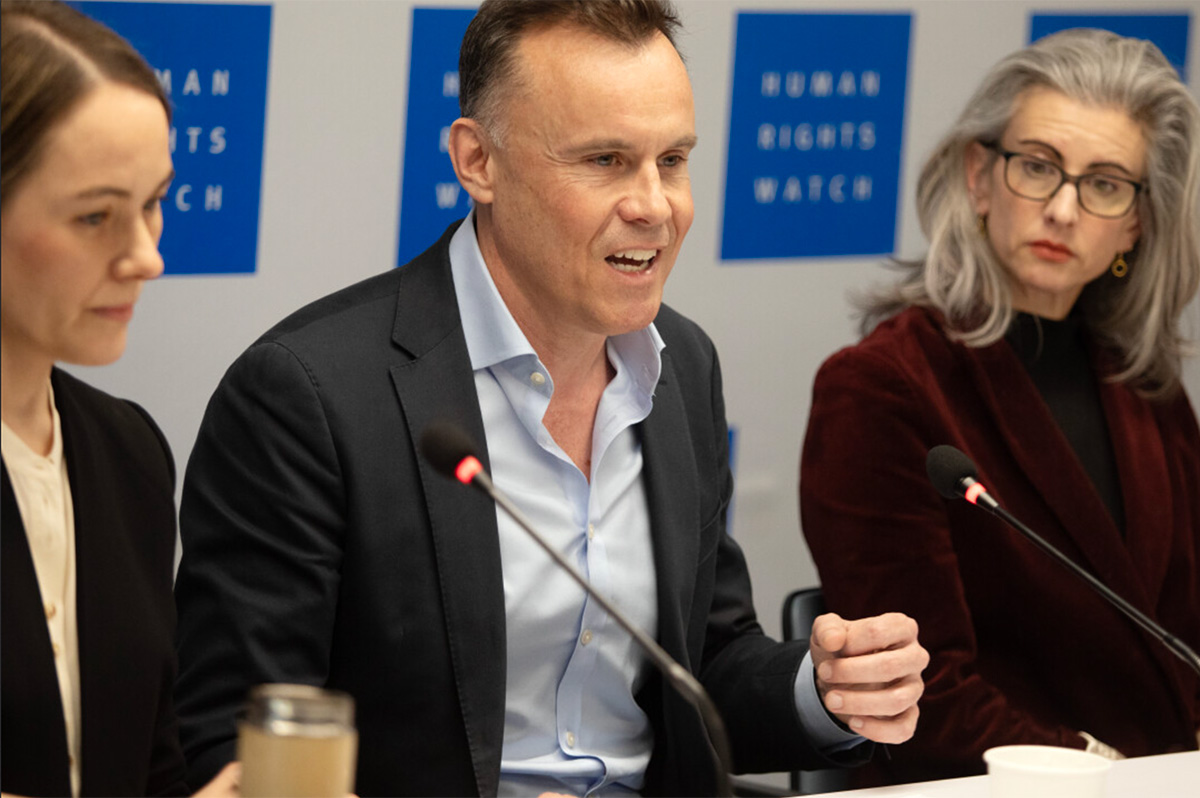National
Out-of-state activists headed to N.C. to fight amendment
Volunteers ready to staff phone banks, boost turnout for Tuesday vote

For K. Travis Ballie, helping with the campaign against Amendment One in North Carolina represents a chance to reverse the losses on state ballot initiatives in the more than 30 states that have seen votes on marriage equality.
“I’m going down because 2012 is a very unique year, even since 2004, when we saw the greatest number of marriage amendments on the ballot, we didn’t defeat any of them,” Ballie said. “Now in 2012, we have an anti-marriage amendment on the ballot in a southern state, in North Carolina, which also happens to be one of the most important swing states in this election cycle.”
Ballie, a gay 23-year-old Silver Spring, Md., resident, said he’s personally invested in the fight against the anti-gay measure — which will come before state voters Tuesday and would make a ban on same-sex marriage part of the state constitution — because he has gay friends in North Carolina, including one who had a marriage ceremony in the state a few weeks ago.
“This is really her marriage on the ballot,” Ballie said. “When there are people like Hillary that are in North Carolina that are just pleading for help from activists across the country, the only moral response is to go down to North Carolina and really help defeat this amendment.”
Ballie said challenging anti-gay amendments wherever they emerge across the country is important.
“I think we’re at a point where our community understands that we need to put up a fight wherever an amendment happens, be it a Southern state, be it the Northeast, anywhere in the country,” Ballie said. “These amendments are politically feasible to be defeated and even if we lose, which we won’t, we are really orchestrating one of the largest LGBT-focused statewide campaigns in North Carolina, one of the fastest growing states in our country.”
Ballie is one of several LGBT rights supporters — coming from places like D.C., Sacramento and Chicago — who are expected to travel to North Carolina to help in the campaign against Amendment One.
Another D.C.-area resident, Bryan Oklin, a gay 28-year-old attorney, said he also intends to travel to North Carolina to participate in efforts against Amendment One, calling it a “misguided, divisive measure,” because of the negative effect it would have on LGBT families.
“It seeks to enshrine in the North Carolina state Constitution that one group of the state’s citizens deserves less civil rights than all others,” Oklin said. “It is a backwards, bigoted initiative reminiscent of a past, less tolerant period of time.”
Same-sex marriage is already barred by statute in North Carolina. Opponents say the measure would not only make that ban part of the state constitution, but also prohibit civil unions and interfere with domestic partner benefits offered by municipalities as well as threaten contractual arrangements between same-sex partners.
Adam Bink, director of online programs for the Courage Campaign and an organizer for grassroots efforts against Amendment One, said the Coalition to Protect All NC Families, the campaign against Amendment One, will have more than 100 volunteers coming from out of state either through their signup form or through the Human Rights Campaign. On top of that, Courage Campaign will bring in 15 additional supporters.
“We’ll be putting volunteers to work at phone banks, events like OutRaleigh 2012 this weekend, and going to doors to talk to voters and leave reminders to vote across college campuses and in neighborhoods,” Bink said. “They’ll be focused on one core mission: ensuring we get our supporters to the polls.”
Bink said the out-of-state efforts that helped lead to the passage of California’s Proposition 8 are a stark reminder of why outside support can be important.
“Courage Campaign members from across the country wrote in to tell us they’re going because don’t want to leave any state behind, and because they understand that Amendment 1 goes too far in hurting families across North Carolina,” Bink said. “Our members will never forget the busloads of volunteers from outside California that helped pass Prop 8. We’ve learned from that experience.”
It’s this memory of Prop 8 that is motivating Amanda Wallner, a 24-year-old lesbian from Sacramento, Calif., to travel to North Carolina. For her, the memory of the passage of Prop 8 in 2008 as a college student and the rescinding of the marriage law in Maine in 2009 — which she helped fight — both weigh heavily on her.
“The loss of the ‘No on 8’ campaign hit me really hard,” Wallner said. “When we lost, I could barely get out of bed the next day. I still get emotional sometimes when I read about it. Any opportunity that I have to apply some of the lessons that I learned during that campaign to help out other LGBT people — I’m really excited to have the opportunity.”
Wallner added that going door-to-door explaining the harm of anti-gay amendments brings the biggest gains for the LGBT movement.
“That’s one of the reasons that I love electoral campaigns so much,” Wallner said. “It gives me that opportunity to talk to people face to face, and for them to be able to put a face to the issue.”
These activists could face an uphill battle; polls have shown majority support for the amendment, though there has been a shift in momentum in recent weeks.
Larry Sabato, a political scientist at the University of Virginia, said he thinks the amendment is likely to pass as similar marriage amendments have in the past.
“I couldn’t guess the margin at the moment, but it is hard to see how it fails to garner a majority ‘yes’ vote,” Sabato said. “The usual patterns are emerging: Seniors are strongly in favor and young people are the least likely to back it, Democrats are opposed while Republicans support.”
Even so, the pro-LGBT side in the race has a funding advantage over proponents of the anti-gay amendment. According to media reports, the Coalition to Protect All NC Families has raised $2.3 million to date and has $294,000 in cash on hand, while Vote for Marriage NC has raised a total of $1.2 million and has $112,000 in cash on hand. The pro-LGBT side is touting that individual small donations make up the bulk of its funds, while large contributions from the Christian Action League and the National Organization for Marriage made up the other side.
Moreover, recent polling shows support for the marriage amendment is declining. Data published last week by Public Policy Polling found only 54 percent of voters in the state plan to vote for it, while 40 percent are opposed to the measure. That’s the lowest level of support for the measure that PPP has found in polling since last October.
Bink said the decline in support for the North Carolina amendment shows the pro-LGBT side is within “striking distance” of victory.
“What’s more, the same poll shows that the more North Carolinians learn what Amendment One does, the less they support it, which is why an original 27-point lead has been cut in half,” Bink said. “A supermajority of North Carolinians oppose a constitutional amendment that bans same-sex marriage as well as civil unions and domestic partnerships for unmarried couples of any gender, endangers domestic violence laws, and takes benefits like health insurance away from children of unmarried couples.”
Puerto Rico
Bad Bunny shares Super Bowl stage with Ricky Martin, Lady Gaga
Puerto Rican activist celebrates half time show

Bad Bunny on Sunday shared the stage with Ricky Martin and Lady Gaga at the Super Bowl halftime show in Santa Clara, Calif.
Martin came out as gay in 2010. Gaga, who headlined the 2017 Super Bowl halftime show, is bisexual. Bad Bunny has championed LGBTQ rights in his native Puerto Rico and elsewhere.
“Not only was a sophisticated political statement, but it was a celebration of who we are as Puerto Ricans,” Pedro Julio Serrano, president of the LGBTQ+ Federation of Puerto Rico, told the Washington Blade on Monday. “That includes us as LGBTQ+ people by including a ground-breaking superstar and legend, Ricky Martin singing an anti-colonial anthem and showcasing Young Miko, an up-and-coming star at La Casita. And, of course, having queer icon Lady Gaga sing salsa was the cherry on the top.”
La Casita is a house that Bad Bunny included in his residency in San Juan, the Puerto Rican capital, last year. He recreated it during the halftime show.
“His performance brought us together as Puerto Ricans, as Latin Americans, as Americans (from the Americas) and as human beings,” said Serrano. “He embraced his own words by showcasing, through his performance, that the ‘only thing more powerful than hate is love.’”
National
Human Rights Watch sharply criticizes US in annual report
Trump-Vance administration ‘working to undermine … very idea of human rights’

Human Rights Watch Executive Director Philippe Bolopion on Wednesday sharply criticized the Trump-Vance administration over its foreign policy that includes opposition to LGBTQ rights.
“The U.S. used to actually be a government that was advancing the rights of LGBT people around the world and making sure that it was finding its way into resolutions, into U.N. documents,” he said in response to a question the Washington Blade asked during a press conference at Human Rights Watch’s D.C. offices. “Now we see the opposite movement.”
Human Rights Watch on Wednesday released its annual human rights report that is highly critical of the U.S., among other countries.
“Under relentless pressure from U.S. President Donald Trump, and persistently undermined by China and Russia, the rules-based international order is being crushed, threatening to take with it the architecture human rights defenders have come to rely on to advance norms and protect freedoms,” said Bolopion in its introductory paragraph. “To defy this trend, governments that still value human rights, alongside social movements, civil society, and international institutions, need to form a strategic alliance to push back.”

The report, among other things, specifically notes the U.S. Supreme Court’s Skrmetti decision that uphold a Tennessee law banning gender-affirming medical interventions for minors.
The Trump-Vance administration has withdrawn the U.S. from the U.N. LGBTI Core Group, a group of U.N. member states that have pledged to support LGBTQ and intersex rights, and the U.N. Human Rights Council. Bolopion in response to the Blade’s question during Wednesday’s press conference noted the U.S. has also voted against LGBTQ-inclusive U.N. resolutions.
Maria Sjödin, executive director of Outright International, a global LGBTQ and intersex advocacy group, in an op-ed the Blade published on Jan. 28 wrote the movement around the world since the Trump-Vance administration took office has lost more than $125 million in funding.
The U.S. Agency for International Development, which funded myriad LGBTQ and intersex organizations around the world, officially shut down on July 1, 2025. The Trump-Vance administration last month announced it will expand the global gag rule, which bans U.S. foreign aid for groups that support abortion and/or offer abortion-related services, to include organizations that promote “gender ideology.”
“LGBTQ rights are not just a casualty of the Trump foreign policy,” said Human Rights Watch Washington Director Sarah Yager during the press conference. “It is the intent of the Trump foreign policy.”
The report specifically notes Ugandan authorities since the enactment of the country’s Anti-Homosexuality Act in 2023, which punishes “‘carnal knowledge’ between people of the same gender” with up to life in prison, “have perpetrated widespread discrimination and violence against lesbian, gay, bisexual, and transgender (LGBT) people, their families, and their supporters.” It also highlights Russian authorities “continued to widely use the ‘gay propaganda’ ban” and prosecuted at least two people in 2025 for their alleged role in “‘involving’ people in the ‘international LGBT movement’” that the country’s Supreme Court has deemed an extremist organization.
The report indicates the Hungarian government “continued its attacks on and scapegoating of lesbian, gay, bisexual, and transgender (LGBT) people” in 2025, specifically noting its efforts to ban Budapest Pride that more than 100,000 people defied. The report also notes new provisions of Indonesia’s penal code that took effect on Jan. 2 “violate the rights of women, religious minorities, and lesbian, gay, bisexual, and transgender (LGBT) people, and undermine the rights to freedom of speech and association.”
“This includes the criminalization of all sex outside of marriage, effectively rendering adult consensual same-sex conduct a crime in Indonesia for the first time in the country’s history,” it states.
Bolopion at Wednesday’s press conference said women, people with disabilities, religious minorities, and other marginalized groups lose rights “when democracy is retreating.”
“It’s actually a really good example of how the global retreat from the U.S. as an actor that used to be very imperfectly — you know, with a lot of double standards — but used to be part of this global effort to advance rights and norms for everyone,” he said. “Now, not only has it retreated, which many people expected, but in fact, is now working against it, is working to undermine the system, is working to undermine, at times, the very idea of human rights.”
“That’s definitely something we are acutely aware of, and that we are pushing back,” he added.
Maryland
4th Circuit dismisses lawsuit against Montgomery County schools’ pronoun policy
Substitute teacher Kimberly Polk challenged regulation in 2024

A federal appeals court has ruled Montgomery County Public Schools did not violate a substitute teacher’s constitutional rights when it required her to use students’ preferred pronouns in the classroom.
The 4th U.S. Circuit Court of Appeals in a 2-1 decision it released on Jan. 28 ruled against Kimberly Polk.
The policy states that “all students have the right to be referred to by their identified name and/or pronoun.”
“School staff members should address students by the name and pronoun corresponding to the gender identity that is consistently asserted at school,” it reads. “Students are not required to change their permanent student records as described in the next section (e.g., obtain a court-ordered name and/or new birth certificate) as a prerequisite to being addressed by the name and pronoun that corresponds to their identified name. To the extent possible, and consistent with these guidelines, school personnel will make efforts to maintain the confidentiality of the student’s transgender status.”
The Washington Post reported Polk, who became a substitute teacher in Montgomery County in 2021, in November 2022 requested a “religious accommodation, claiming that the policy went against her ‘sincerely held religious beliefs,’ which are ‘based on her understanding of her Christian religion and the Holy Bible.’”
U.S. District Judge Deborah Boardman in January 2025 dismissed Polk’s lawsuit that she filed in federal court in Beltsville. Polk appealed the decision to the 4th Circuit.
-

 a&e features5 days ago
a&e features5 days agoMarc Shaiman reflects on musical success stories
-

 Television4 days ago
Television4 days agoNetflix’s ‘The Boyfriend’ is more than a dating show
-

 Movies5 days ago
Movies5 days ago50 years later, it’s still worth a return trip to ‘Grey Gardens’
-

 Opinions5 days ago
Opinions5 days agoSnow, ice, and politics: what is (and isn’t) happening





















